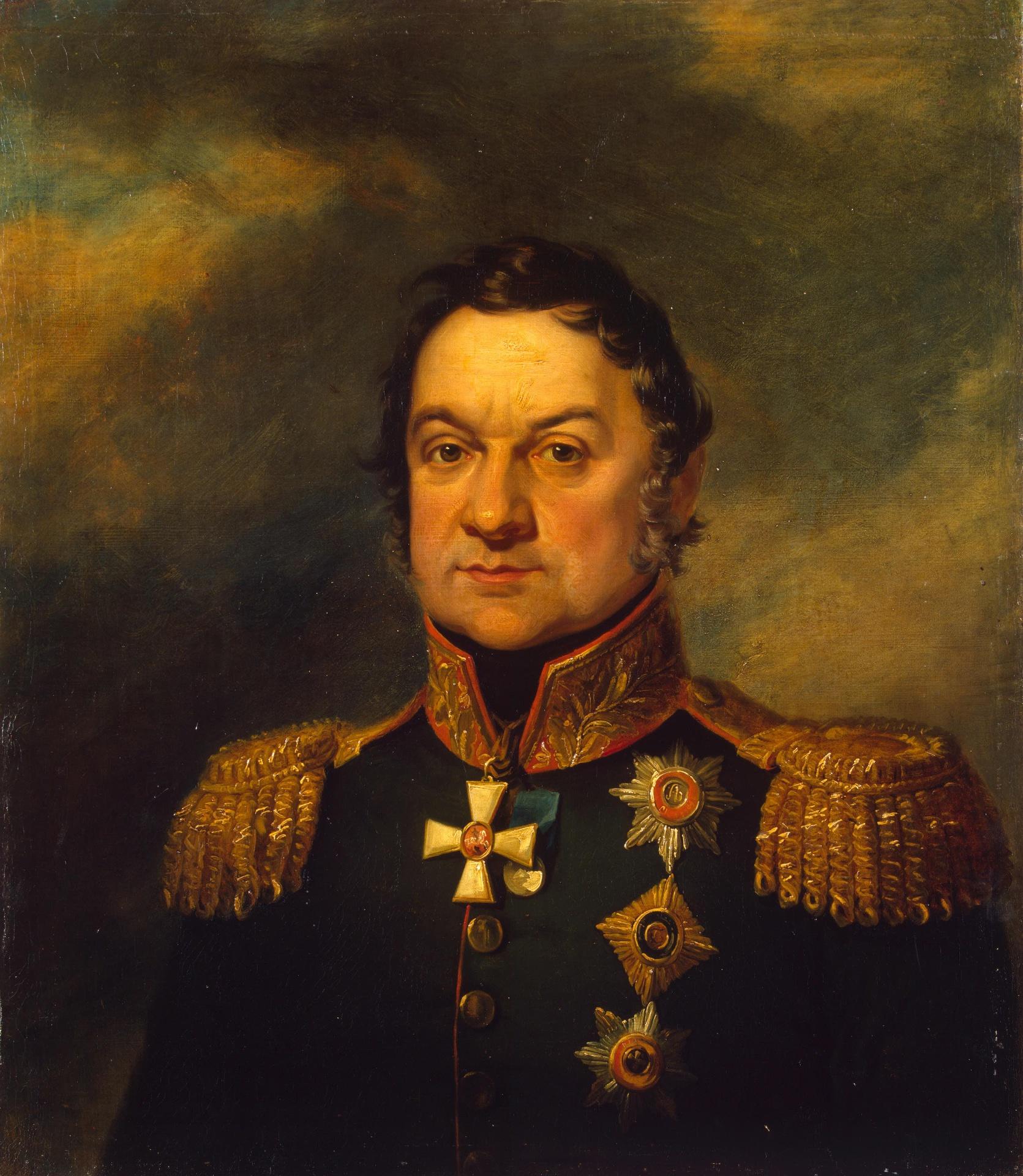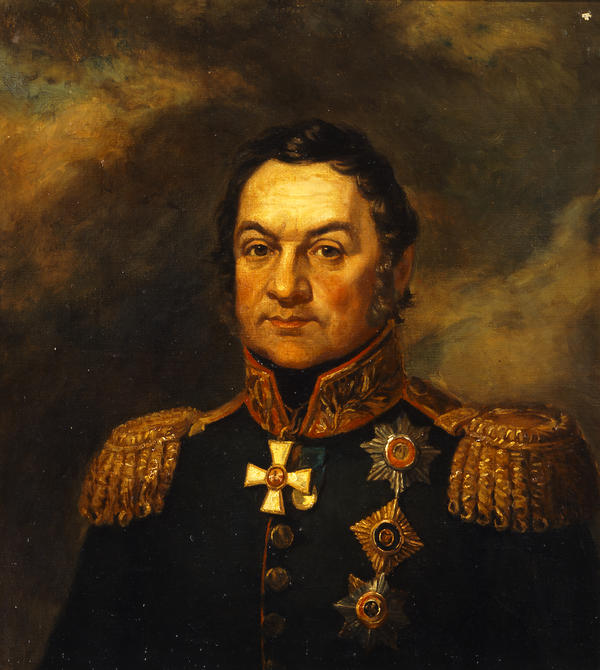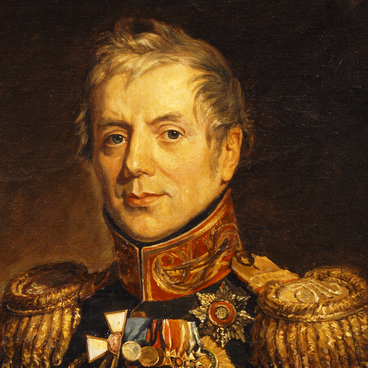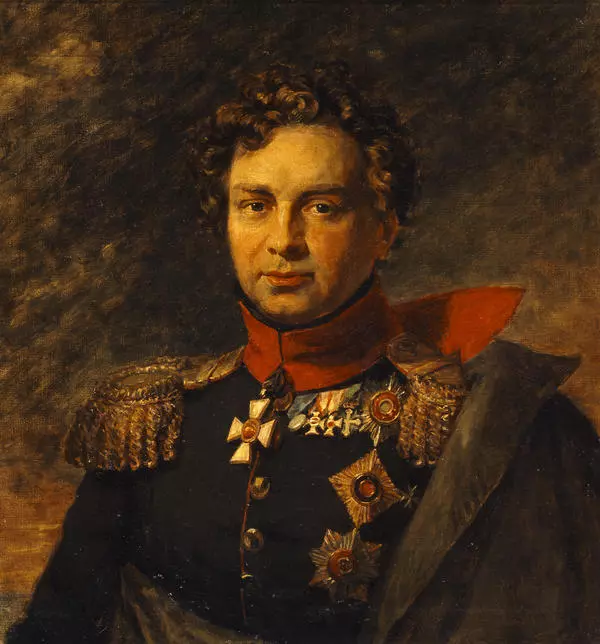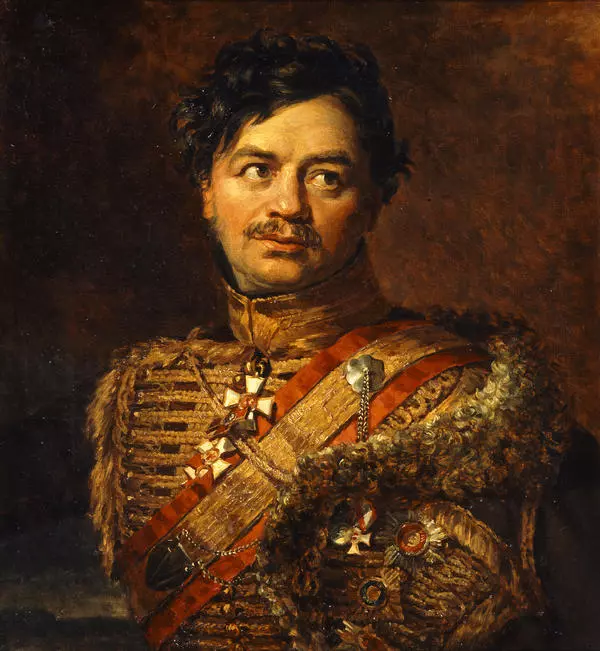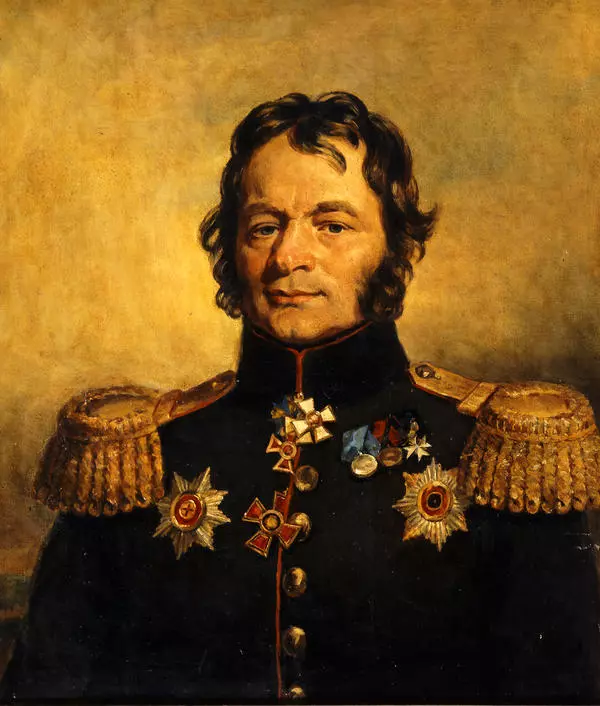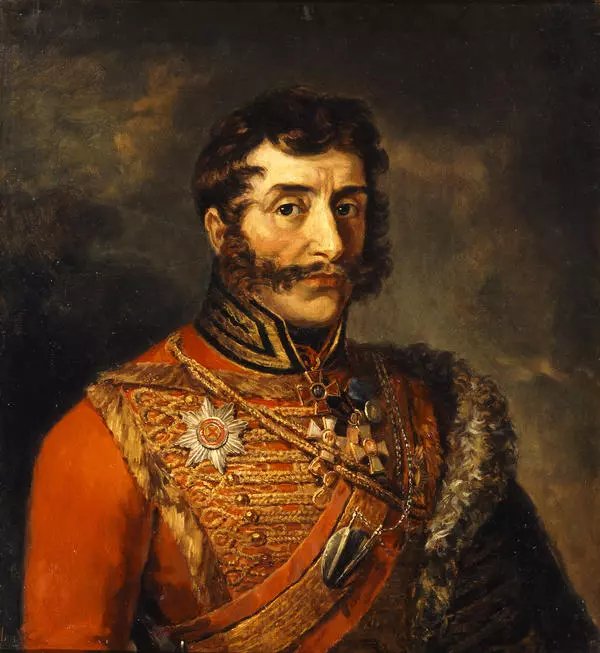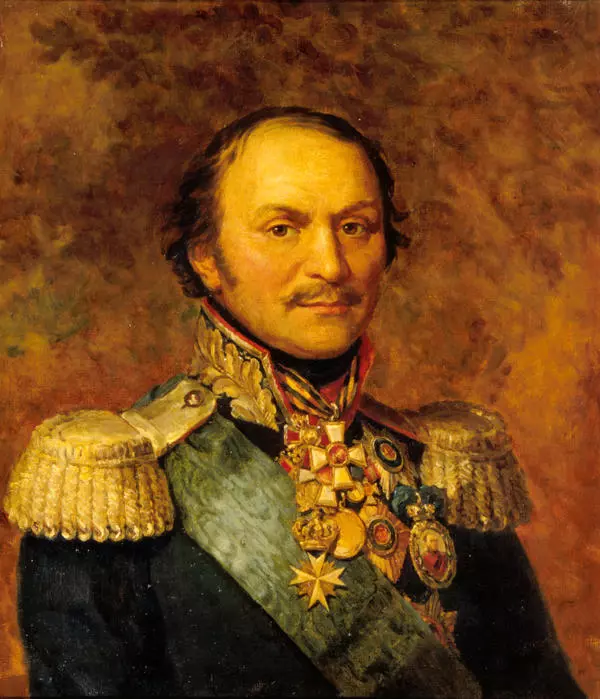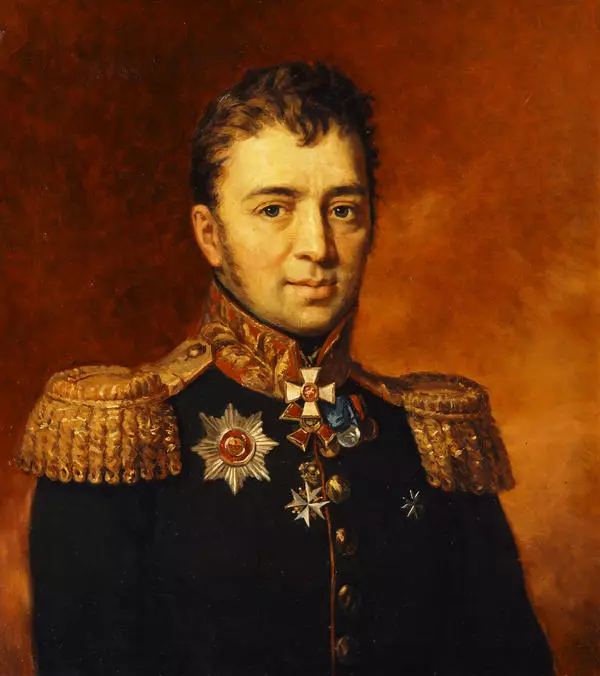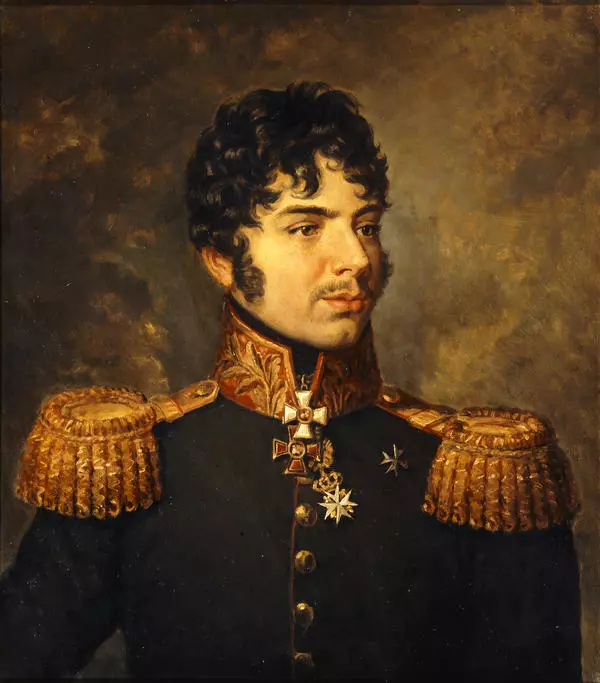Dmitry Dokhturov was born in 1759, came from the Tula Governorate nobles. He received his education at the Page Corps, a prestigious military educational institution in St. Petersburg. In 1781 he was promoted to lieutenant in the Life Guards Preobrazhensky Regiment.
Dokhturov participated in the Russo-Swedish war of 1789-1790, during which he was twice wounded. In 1797 he was promoted to major general, and two years later — to lieutenant general. From 1803, he became Chief of the Moscow Infantry Regiment and the infantry inspector of the Kiev Inspection.
In the 1805-1806 wars with France, the general took part in the Battles of Dürenstein, Austerlitz, Golymin. In 1807, in the largest battle of the war of the Fourth Coalition at Preussisch-Eylau, Dokhturov was strongly concussed in his right leg, but he did not leave the battlefield, and for the distinguished conduct was awarded a gold sword with diamonds with the inscription ‘For Courage’. He also fought in the battles of Guttstadt-Deppen, Heilsberg and Friedland.
In 1810, Dokhturov was promoted to General of the Infantry and appointed Commander of the 6th Infantry Corps. At the beginning of the 1812 campaign, the 6th Corps was cut off by the enemy from the 1st Western Army, but Dokhturov managed to bring it to a junction with the main forces.
During the Battle of Smolensk on August 5, 1812, Dokhturov was appointed to lead the defense of the city. The day before, he had been unwell, seriously suffering from a ‘fever’, but he accepted the difficult appointment with the words: ‘If I am to die, it is better to die on the field of honor than inglorious in bed’. Despite his illness, he repulsed the enemy’s fierce attacks throughout the whole day and then joked that Smolensk had “cured” him.
In the battle of Borodino on August 26, Dokhturov’s Corps acted in the center of the Russian positions. The general led the 2nd Western Army after Commander-in-Chief Bagration was severely injured. He managed to restore order in the troops of the left flank and to hold the ground behind the Semyonovsky ravine. As soldiers used to say, ‘If Dmitry Sergeyevich takes up station somewhere, you need to call a team with levers, otherwise you won’t budge him’. For his achievements in battle, Alexander I granted Dokhturov the Order of Saint Alexander Nevsky with diamonds.
At the Military Council on September 1, at Fili, Dokhturov was one of those who spoke out for a battle near Moscow. For the distinguished conduct in the Battle of Maloyaroslavets on October 12, he received the Order of Saint George of the 2nd Class, one of the highest decorations of the Russian Empire.
In the European campaigns, Dokhturov commanded a corps as part of the Polish army, distinguished himself in the Battle of Leipzig, led the siege of Magdeburg in 1813 and Hamburg in 1814. During the 1815 campaign to France, the general commanded the right wing of the Russian army.
Due to poor health, contemporaries spoke of the general: “In a weak body, he had an iron soul.” Dokhturov eventually died of illness in 1816, in his house in Moscow.
Dokhturov participated in the Russo-Swedish war of 1789-1790, during which he was twice wounded. In 1797 he was promoted to major general, and two years later — to lieutenant general. From 1803, he became Chief of the Moscow Infantry Regiment and the infantry inspector of the Kiev Inspection.
In the 1805-1806 wars with France, the general took part in the Battles of Dürenstein, Austerlitz, Golymin. In 1807, in the largest battle of the war of the Fourth Coalition at Preussisch-Eylau, Dokhturov was strongly concussed in his right leg, but he did not leave the battlefield, and for the distinguished conduct was awarded a gold sword with diamonds with the inscription ‘For Courage’. He also fought in the battles of Guttstadt-Deppen, Heilsberg and Friedland.
In 1810, Dokhturov was promoted to General of the Infantry and appointed Commander of the 6th Infantry Corps. At the beginning of the 1812 campaign, the 6th Corps was cut off by the enemy from the 1st Western Army, but Dokhturov managed to bring it to a junction with the main forces.
During the Battle of Smolensk on August 5, 1812, Dokhturov was appointed to lead the defense of the city. The day before, he had been unwell, seriously suffering from a ‘fever’, but he accepted the difficult appointment with the words: ‘If I am to die, it is better to die on the field of honor than inglorious in bed’. Despite his illness, he repulsed the enemy’s fierce attacks throughout the whole day and then joked that Smolensk had “cured” him.
In the battle of Borodino on August 26, Dokhturov’s Corps acted in the center of the Russian positions. The general led the 2nd Western Army after Commander-in-Chief Bagration was severely injured. He managed to restore order in the troops of the left flank and to hold the ground behind the Semyonovsky ravine. As soldiers used to say, ‘If Dmitry Sergeyevich takes up station somewhere, you need to call a team with levers, otherwise you won’t budge him’. For his achievements in battle, Alexander I granted Dokhturov the Order of Saint Alexander Nevsky with diamonds.
At the Military Council on September 1, at Fili, Dokhturov was one of those who spoke out for a battle near Moscow. For the distinguished conduct in the Battle of Maloyaroslavets on October 12, he received the Order of Saint George of the 2nd Class, one of the highest decorations of the Russian Empire.
In the European campaigns, Dokhturov commanded a corps as part of the Polish army, distinguished himself in the Battle of Leipzig, led the siege of Magdeburg in 1813 and Hamburg in 1814. During the 1815 campaign to France, the general commanded the right wing of the Russian army.
Due to poor health, contemporaries spoke of the general: “In a weak body, he had an iron soul.” Dokhturov eventually died of illness in 1816, in his house in Moscow.


